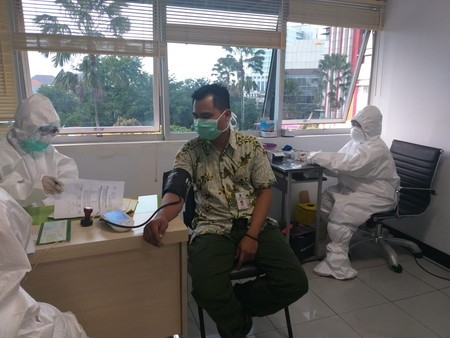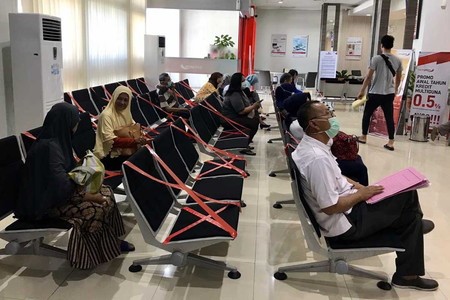【20-05】インドネシアにおける新型コロナウイルスのパンデミック
2020年4月30日 Muhammad Thohawi Elziyad Purnama(さくらサイエンスプラン(SSP)同窓生)
科学技術振興機構(JST)中国総合研究・さくらサイエンスセンター(CRSC)では、2014年度より日本・アジア青少年サイエンス交流事業「さくらサイエンスプラン(SSP)」を実施し、科学技術交流を通じてわが国とアジア各国・地域との連携・協力関係を深めてまいりました。各種報道の通り、現在、世界中で新型コロナウイルス感染症の流行が拡大しておりますが、本コーナーでは「さくらサイエンスプラン」に参加している各国・地域の関係機関・関係者より現地の新型コロナウイルス感染症について、その状況や対策等をリポートします。
2019年の年末から問題視されていた新型コロナウイルスの感染拡大。新型コロナウイルスは世界210の国と地域、2つの国際的なクルーズ客船に甚大な影響を及ぼしており、2020年4月19日時点で確認された陽性者数は234万856人、総死亡者数は160,903人となっています。インドネシアにおける新型コロナウイルスのパンデミックは、2020年3月2日に西ジャワ州のデポックで2人の陽性者が確認されたことから始まりました。実証確認の結果、アーティストとして活動していた2人の患者が外国人と接触していたことが判明しました。2020年4月18日現在、新型コロナウイルスの陽性者は6,248人で、回復者は631人(10.1%)、死亡者は535人(8.6%)になります。特にスラバヤ市では270人の陽性者が確認され、回復者45人(16.7%)、死亡者29人(10.7%)になります。この発生率の高さから、インドネシアはASEAN諸国の新型コロナウイルス確定症例数が最も高い国となり、アジアでは11位となっています。
一方、インドネシア共和国保健省では、新型コロナウイルスの疑いがある人をいくつかのステータスレベルに分類しています。
a. 医療監視下にある感染疑惑患者:急性呼吸器感染症、すなわち発熱(38℃以上)を有し、咳、呼吸困難、インフルエンザ、軽度から重度の肺炎のいずれかの呼吸器疾患の症状・徴候を伴い、臨床症状に基づく他の発病要素がなく、症状が出る前の14日間に旅行歴または現地での感染が報告されている国・地域に居住した経験があり、新型コロナウイルスが確認された人との接触歴がある人を基準とし、医療機関の監視下にある患者。
b. 医療監視を受けている人:すなわち、発熱(38℃以上)を経験している人、またはインフルエンザ、咽頭痛、咳などの呼吸器系障害の症状を経験している人で、臨床症状に基づく他の発病要素がなく、症状が発生する前の直近14日間に旅行歴または現地感染が報告されている国・地域に居住しており、新型コロナウイルスが確認された人との接触歴がある人。
これらの基準に基づき、医療監視下にある感染疑惑患者は12,979人、医療監視を受けている人は176,344人と報告されている。
インドネシア共和国政府は新型コロナウイルスの感染拡大を国難と指定し、ジャカルタ、西ジャワ州など大量発生している一部の地域や地区を含む、最も症例が多く確認された州で大規模な社会的制限を実施する方針を発表しました。大型の市場、スーパーマーケット、教育機関、オフィスなど、大勢の人が集まる場所はすべて一時的に閉鎖されました。特定の業務や、交互に出勤する人は業務に従事することが許されています。実際、モスクや教会、寺院なども一時的に閉鎖され、すべての人々がそれぞれの家から礼拝するようになっています。これらは全て、新型コロナウイルスの感染の連鎖を断ち切ることを目的としています。政府は、中間層の人々の経済状況を守るために、ロックダウンを決定したのではありません。一部の経済活動、公共交通機関、公共アクセス、食料品店、物流の移動は一部許可されています。外出時には毎回マスク着用することを義務づけ、ソーシャルディスタンスの適用、こまめな手洗い、公共施設での消毒、自宅隔離をより良くするためのキャンペーンなども実施しました。
政府は新型コロナウイルスが確認された陽性患者のために132もの感染病院を設置しています。また、医師、看護師、患者の家族、患者と接触したことのある人など、ハイリスクな人々を対象にPCR検査の数量を増やしています。また、医療機器、医薬品、病院の改修、下層経済圏への援助などのために405兆ルピア(260億ドル)の予算を用意するなど、新型コロナウイルスへの対応にも力を入れています。

医療監視下にある感染疑惑患者の検査
新型コロナウイルスのパンデミックについては、人口が多く、多様な社会状況が混雑しているインドネシアでは、外出してはいけないという命令を実行することは非常に困難です。また、中間経済層以下の人々の経済面を考慮して、外出禁止政策を取らないようにしなければいけません。大規模な社会的制限政策により、社交的で集団行動を好むインドネシア人で、かなり大きな影響を及ぼしました。新型コロナウイルスのパンデミックは他にも、清潔な生活習慣や、栄養バランスのとれた食事を維持し、労働や礼拝をし、家族や友人、同僚との時間を大切にすることがいかに重要であるかという教訓を与えてくれました。政府は、経済状況、財政政策、物価統制、ルピア為替レートのコントロール、パンデミック終了後の観光業の回復、医療サービスの質の維持、失業者のための新たな雇用の開放、人道的な社会支援などといった政策をとるため慎重に動いています。政府もイード・アル・フィトルの休日の間に人々が集まることを制限しています。すべての面で政府は、パンデミックがいち早く終息するように働きかけています。

公共施設でのソーシャルディスタンス
新型コロナウイルスの状況下で、私は大学の方針に沿って自宅から業務を行いました。私の授業や試験はすべてZoomと大学のプラットフォームを利用したオンライン試験で行っています。研究活動は非常に限られており、研究室を数人で交代し利用しています。コミュニティにおける交流活動も一時的に延期されています。買い物する時は公共交通機関ではなく、オンラインで交通手配(Gojek または Grab)しています。私が外出する時は、何か標準的な手順で何かしらの作業を行うときだけです。
※本稿はさくらサイエンスプラン同窓生からの寄稿文を中国総合研究・さくらサイエンスセンターが日本語訳したものである。
●英文オリジナル
COVID-19 Pandemic in Indonesia
Reported by Muhammad Thohawi Elziyad Purnama
Outbreak Coronavirus Diseases 2019 (COVID-19) has been an important issue since the end of 2019. The coronavirus COVID-19 is affecting 210 countries and territories around the world and 2 international conveyances, with a grand total confirmed positive cases of 2,340,856 and total deaths of 160,903 as of April 19, 2020[1]. COVID-19 pandemic in Indonesia began with the findings of two positive people in Depok, West Java who confirmed the disease on March 2, 2020. The results of the track record turned out to be the two patients working as artists who had contact with foreign citizens. As of April 18, 2020, there had been 6,248 positive cases of COVID-19 with 631 (10.1%) recovered and 535 (8.6%) dead[2]. In particular, the incidence in Surabaya City of 270 positive people was confirmed with 45 (16.7%) recovered and 29 (10.7%) dead [3]. The incident rate makes Indonesia the highest country in COVID-19 confirmed cases in ASEAN countries and ranked 11th in Asia [1].
Meanwhile, The Ministry of Health of the Republic of Indonesia divides people suspected of COVID-19 into several status levels, i.e.:
a.Patients under surveillance with criteria for people with acute respiratory infections, i.e. fever (≥38°C); accompanied by one of the symptoms/signs of respiratory disease: cough, dyspnea, flu, or mild to severe pneumonia and there are no other causes based on clinical symptoms and in the last 14 days before the symptoms have a history of travel or living in the country/region reporting local transmission and has a history of contact with confirmed COVID-19 people.
b.People in monitoring, i.e. experiencing a fever (≥38°C); or symptoms of respiratory system disorders such as flu, sore throat, or cough and there are no other causes based on convincing clinical symptoms and in the last 14 days before symptoms occur to have a history of travel or living in a country/region that reports local transmission and has a history of contact with cases COVID-19 confirmation[4].
Based on these criteria there were reported as many as 12,979 patients under surveillance and 176,344 in monitoring [5].
The Government of the Republic of Indonesia has determined COVID-19 as a national disaster and issued a policy to implement large-scale social restrictions in several provinces with the most confirmed cases, including Jakarta, West Java and some regions or districts with massive numbers. All places that allow many people to gather, such as large markets, supermarkets, schools, universities, and offices were temporarily closed. Only people with specific or alternately scheduled tasks are allowed to work. In fact, mosques, churches, and temples are also temporarily closed so that all people worship from their respective homes. It all aims to break the chain of transmission of COVID-19. The government did not make a Lockdown decision to protect the economic situation for the middle-class people. Some economic activities, public transportation, public access, food stores, and logistics transfers were given a partial permit. The policy was followed by mandatory wearing masks every time he left the house, applying physical distancing, frequent hand washing, disinfection in public facilities and campaigns to better stay at home. The government has established 132 referral hospitals for positive patients confirmed COVID-19. The government is also increasing the rapid test activity followed by PCR for high-risk people such as doctors, nurses, patients' families and people who have been in contact with patients. The social policy was also taken by the government by preparing a budget of 405 trillion rupiahs or 26 billion dollars for medical devices, drugs, renovation of hospitals and aid for the lower class economic community[6].
Regarding the COVID-19 pandemic, our country with a high population and diverse conditions of society is indeed very difficult to implement the command to discipline not to leave the house. The economic aspects of people with the lower middle economic class must be considered so that the lockdown policy is not taken. Even the large-scale social restriction policy has made a very significant change in people's behavior due to it is typical of Indonesian people who are high in socializing and gathering. The COVID-19 pandemic also provides lessons on how important it is to maintain a clean lifestyle, a balanced nutritional diet, to respect the time to work professionally, to worship and to appreciate the time available with family, friends, and colleagues. The government carefully calculates how to restore the economic situation, fiscal policy, price control, control of the rupiah exchange rate, restore tourism potential after the pandemic ends, maintain the quality of health services, open new jobs for unemployment, and humanitarian social assistance. The government has even officially controlled the potential for people to gather during the Eid al-Fitr holiday. All aspects have been thought by the government so that the pandemic will end soon.
During the COVID-19 situation, I carried out activities from home according to the policy of the University. All my teaching activities are done with Zoom meetings and online examinations using the university application platform. Research activities are very limited, only a few people take turns using the laboratory. Community empowerment activities have been temporarily postponed. All my shopping activities do use online transportation (Gojek or Grab). I leave the house only when certain situations comply with standard operating procedures.
References:
[1]Worldometer COVID-19 Corona Pandemic April 19, 2020.
[2]Gugus Tugas Percepatan Penanganan COVID-19. 18 April 2020 [Official Website].
[3]East Java Province. 18 April 2020 [Official Website].
[4]The Ministry of Health of the Republic of Indonesia. Pedoman Kesiapsiagaan Menghadapi Coronavirus Disease (COVID-19) Revisi ke-4 (PDF). Jakarta: Direktorat Jenderal Pencegahan dan Pengendalian Penyakit, Kementerian Kesehatan Republik Indonesia.
[5]The Ministry of Health of the Republic of Indonesia. 18 April 2020 [Official Website].
[6]State Secretariat of the Republic of Indonesia. [Official Website].